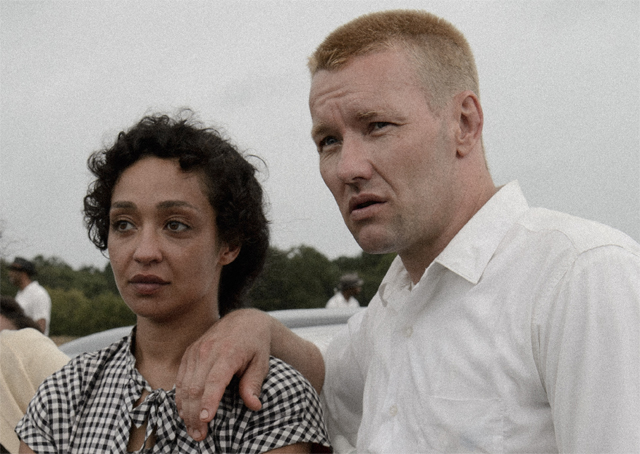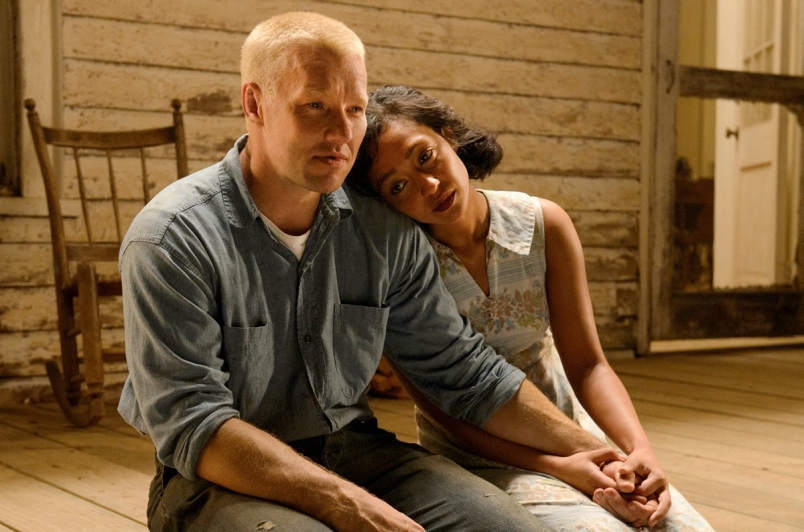Loving (2016)
CAST: Joel Edgerton, Ruth Negga, Christopher Mann, Nick Kroll, Jon Bass, Michael Shannon, Marton Csokas, Bill Camp
REVIEW:
Loving, writer-director Jeff Nichols’ low-key, stately chronicle of actual events spanning 1957-1967 that led to the landmark 1967 Supreme Court ruling overturning state laws against interracial relationships, serves a similar purpose to films covering the same time period and similar subject matter such as 2011’s The Help in serving as a history lesson to those too young to remember a time when racism was still officially written into law.
When we meet Richard Loving (Joel Edgerton) and Mildred Jeter (Ruth Negga), they are a committed long-term couple who make little secret of their relationship despite the anti-miscegenation laws of 1950s Virginia, and decide to tie the knot after they find Mildred is pregnant. Since interracial marriage is illegal in Virginia, they drive to Washington, DC where a justice of the peace declares them husband and wife. They return home and for a brief time things seem to continue uneventfully, with Richard building their new shared house. But their domestic peace is shattered one night when somebody tips off the racist local sheriff (Marton Csokas) and he and his men kick in their door and haul the bewildered Lovings out of bed and throw them in separate jail cells. After a brief stint behind bars, they’re released but still facing pending charges of miscegenation which could earn them a one year prison sentence, and forbidden to see each other. This doesn’t stop Richard, who sneaks into Mildred’s family’s house under cover of darkness, and obtains a lawyer (Bill Camp) who negotiates a deal with the judge to suspend their sentence if they either dissolve their marriage—which they are unwilling to do—or leave Virginia and don’t come back. Uprooting from the Virginia countryside to a crowded and dilapidated neighborhood in Washington DC is difficult enough for both of them, but for Mildred, leaving behind her large family sends her spiraling into depression, and it’s not long before they violate the deal and place their freedom in jeopardy. Eventually, Mildred takes initiative and writes a letter to Attorney General Bobby Kennedy, who refers her to two American Civil Liberties Union lawyers, Bernie Cohen (Nick Kroll) and Phil Hirschkop (Jon Bass), who take up the case.
Jeff Nichols’ depiction of the events is subdued and no-frills, and the focus is firmly on the Lovings’ personal lives. It’s over an hour in before the ACLU lawyers get involved, and even then, the legal battle is a secondary subplot. This is not a courtroom drama, but a personal docudrama with a courtroom drama unfolding in the background. There are no “for your consideration” outbursts or dramatic flourishes that we might expect to see in a historical drama about an emotional subject, and the trial doesn’t get much attention; Cohen and Hirschkop are strictly secondary supporting characters who don’t get a lot of screentime, and their arguments before the Supreme Court are shown in brief excerpts. Since courtroom dramas, even fact-based ones, tend to all follow the same generic beats, in a way it’s refreshing that Loving focuses more on the two main characters’ lives and gives the court aspects a perfunctory skim-through. At the same time, there are times when Loving‘s understated approach keeps us from getting as involved as we might have done. By leaving the Supreme Court hearing mostly offscreen, the conclusion is a bit anti-climactic and doesn’t really build up to anything, maintaining the same sedate tone from beginning to end. There are times when the pacing is erratic, and the decade-spanning timeline is not clearly conveyed.
The movie is handsomely-filmed, and period details are impeccable, right down to small details like the vintage Corelle dishes Mildred uses. Unlike some civil rights dramas, it also doesn’t go the route of vilifying every white character besides Richard; while some—the sheriff, for example—are typical good old boy racists, others are sympathetic to Richard and Mildred’s cause. For that matter, while Mildred’s family embraces Richard as one of their own, not all blacks look kindly on their relationship either. There’s an uneasy scene in which Richard is tailed home by a stranger in a truck with unclear intentions.
 The performances are low-key and subdued, befitting the tone of the film. Joel Edgerton’s Richard isn’t an activist or a rebel, he’s a stoic, taciturn man who keeps to himself and is not given to emotional displays but quietly unwaveringly devoted to Mildred (his character is encapsulated in the moment where Cohen asks if there’s anything he wants him to tell the Supreme Court on his behalf, and Richard simply says “tell them I love my wife”). It’s not a flashy or dynamic character, but Edgerton inhabits his character’s skin; I’ve been unimpressed with several of his recent roles, but this might be his most solid performance since 2011’s Warrior. He is solidly complimented by lesser-known Ruth Negga, whose Mildred finds the self-confidence to grow from a timid, passive woman to holding interviews in their home and courting the press, recognizing the value of publicity even as it makes the socially awkward Richard uncomfortable. No one else gets much screentime. Nick Kroll and Jon Bass (as the Lovings’ quirky lawyers) don’t show up until halfway through and then only sporadically, and Michael Shannon (a regular collaborator of director Nichols) has only one scene as a Life photographer who does a photoshoot of the Loving couple.
The performances are low-key and subdued, befitting the tone of the film. Joel Edgerton’s Richard isn’t an activist or a rebel, he’s a stoic, taciturn man who keeps to himself and is not given to emotional displays but quietly unwaveringly devoted to Mildred (his character is encapsulated in the moment where Cohen asks if there’s anything he wants him to tell the Supreme Court on his behalf, and Richard simply says “tell them I love my wife”). It’s not a flashy or dynamic character, but Edgerton inhabits his character’s skin; I’ve been unimpressed with several of his recent roles, but this might be his most solid performance since 2011’s Warrior. He is solidly complimented by lesser-known Ruth Negga, whose Mildred finds the self-confidence to grow from a timid, passive woman to holding interviews in their home and courting the press, recognizing the value of publicity even as it makes the socially awkward Richard uncomfortable. No one else gets much screentime. Nick Kroll and Jon Bass (as the Lovings’ quirky lawyers) don’t show up until halfway through and then only sporadically, and Michael Shannon (a regular collaborator of director Nichols) has only one scene as a Life photographer who does a photoshoot of the Loving couple.
Loving‘s low-key approach avoids melodramatic cliches but at times seems so determined to avoid melodrama that it avoids drama altogether. The film has a strong degree of historical verisimilitude, but keeps us at a bit of an arm’s length. Loving is an important and interesting history lesson, and a dignified portrait of a couple whose unflagging commitment to each other made history both for themselves and for many others during and since their time, but it’s not as rousing as it could have been.
* * 1/2
